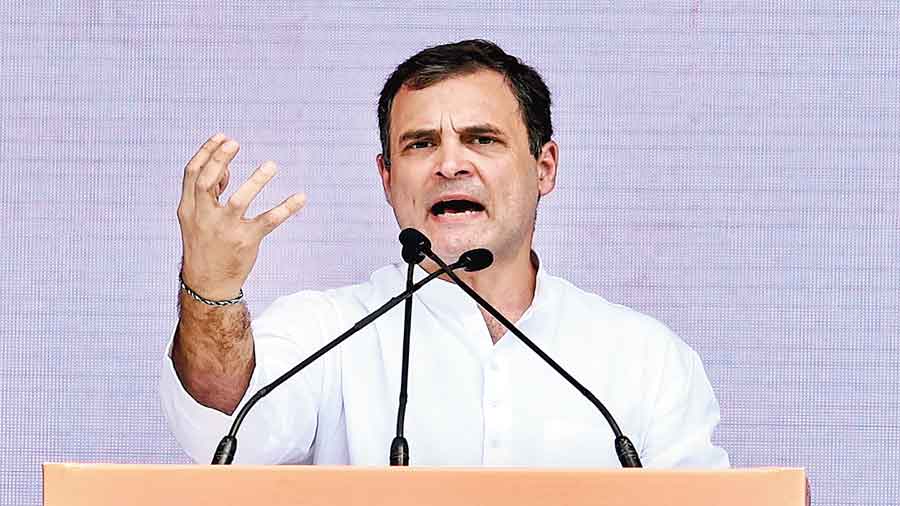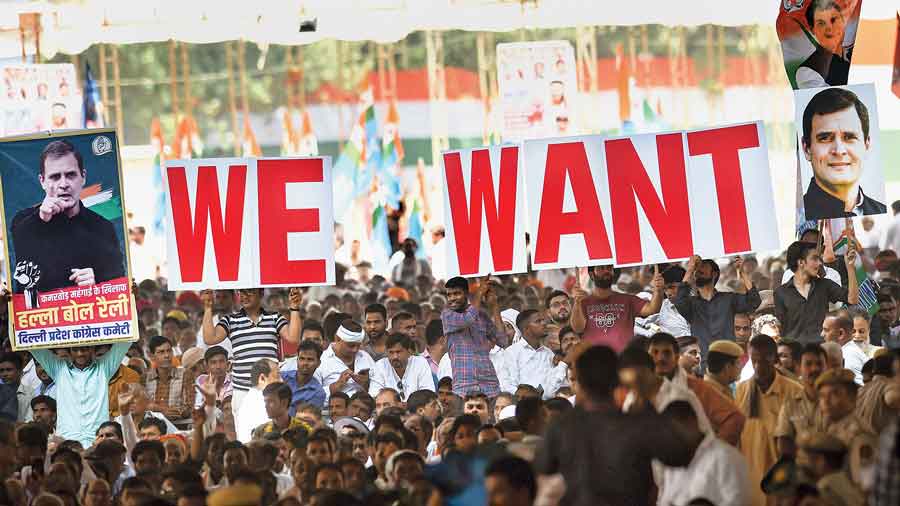Rahul Gandhi on Sunday said India would not survive as a democracy if citizens failed to stand up to protect the constitutional scheme, alleging the government was bent on facilitating corporate loot by crushing all dissent and removing institutional hurdles.
“Hamara samvidhan desh ki atma hai. Iski raksha karna, isko bachane ka kam har nagrik ko karna padega. Agar hum aj nahin khade huye, toh fir ye desh nahin bachega (Our Constitution is the soul of the country. Every citizen will have to protect it. If we don’t stand up today, this country will not survive),” he told a massive rally at the Ramlila Maidan.
Rahul argued that the political and institutional avenues available to the Opposition to expose the government’s wrongdoings had already been demolished, and only popular resistance could therefore save the country.
The former Congress president, who will be leading the Bharat Jodo Yatra from September 7, suggested that the rising unemployment, soaring prices and disharmony in society were direct consequences of a politics that worked brazenly against the constitutional spirit.
“This country is all about the Constitution. This country is about its people’s voices, about the people’s future. This country doesn’t belong to two industrialists. This country belongs to the people,” he said.
Rahul said the government’s control of the media and vital democratic institutions, and its denial of meaningful engagement in Parliament and protests on the streets, had left a direct conversation with the people as the only possible way of mass communication.
He alleged that Prime Minister Narendra Modi’s politics of hate and fear had been purposely designed to facilitate the execution of policies in the interest of two big industrialists.
“Mehngai, berozgari aur nafrat se desh mazboot hota hai kya (Do inflation, unemployment and hate strengthen the country)?” he asked, arguing that the government wanted to keep the people enmeshed in emotive issues while executing pro-corporate policies.
Rahul recalled that Modi’s first act after becoming Prime Minister was to try and kill the Land Acquisition Act, and said the introduction of the now-repealed farm laws manifested the continuation of this trend.
He expanded on the theme throughout his speech, underlining the lowering of the corporate tax and the waiver of bank loans worth Rs 10 lakh crore.
The same tendency was reflected, he said, in the November 2016 demonetisation and the flawed GST, in the weakening of the small and medium enterprises and the handover of public-sector assets to two industrialists.
Rahul said that spreading fear in the country was an imperative for the success of the hate project.
“India is in the grip of fear. Fear of high prices, fear of unemployment, fear of the future. This rising fear is facilitating the spread of hate. Hate is dividing society and weakening the country. Modi has deliberately weakened the country in the last eight years,” he said.
Rahul said: “I want to ask you, who gains from fear and hatred? For whose benefit the RSS-BJP spreads hate, creates fear? Why are they doing this? Does this benefit the poor, farmers, the youth, workers, the small shopkeeper?
“No, only two industrialists are making the most of this abnormal situation. You ask other industrialists and businessmen and they will say they haven’t gained. Everything — port, airport, road, railway, telecom, oil — is going to two people.”
As he reeled off the prices of essential commodities to buttress the charge of unacceptably high inflation, Rahul insisted that the situation would worsen and that this government was incapable of addressing the job crisis.
“In 2014, an LPG cylinder cost Rs 410, which is Rs 1,050 now. Petrol prices have jumped from Rs 70 to Rs 100 and diesel prices from Rs 55 to Rs 90. Milk was Rs 35 a litre in 2014 and sells for Rs 60 now. Mustard oil has jumped from Rs 90 to Rs 200 and flour from Rs 22 to Rs 40,” he said amid cries of appreciation.
Most of the other speakers, who included chief ministers and party office-bearers including state unit chiefs, accused the government of insensitivity, flagging the Prime Minister’s refusal to answer questions on prices, unemployment and communal hatred.
They accused Modi of fooling the people with false promises and continuing to mislead them with false propaganda, and regretted that the government appeared reluctant to even acknowledge the grim reality.












